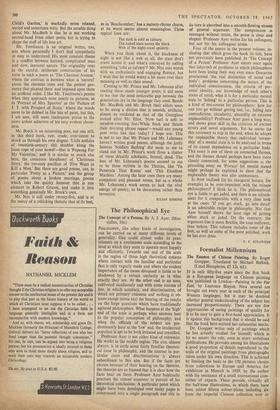The Philosophical Eye
The Concept of a Person. By A. J. Ayer. (Mac- millan, 30s.)
PHILOSOPHY, like other kinds of investigation, can be carried on at many different levels of generality. One could almost order its prac- titioners on a continuous scale according to the level at which they seem to operate most happily and efficiently. Towards one end of the scale is the region of those high theoretical systems where contact with the familiar and particular fact is only vaguely made and where the evident importance of the issues discussed is liable to be shadowed by a certain unclarity as to what exactly they are. At the other end is an area, cultivated assiduously and with some success of late, in which accuracy, and discrimination, of detail are primary concerns and nothing is ob- scure except (some say) the bearing of the results on the large questions which have traditionally agitated philosophers. What happens at the 'high' end of the scale is perhaps what answers best to the popular conception of philosophy; and when the officials of the subject are pre- dominantly busy at the low' end, the intellectual populace is apt to be both irritated and mystified.
Professor Ayer is not either kind of extremist. He works in the middle region. The aim, almost always, is to settle some fairly familiar theoreti- cal issue in philosophy, and the interest in par- ticular cases and discriminations is always subordinate to this aim. But if the facts are chosen because of their bearing on the theories, the theories are so framed that it is clear how the facts bear on them. Professor Ayer habitually practises the utmost economy in pursuit of his theoretical conclusions. A particular point which might have been developed over many pages is compressed into a single paragraph and this in its turn is absorbed into a smooth-flowing stream of general argument. The compression is managed without strain, the prose is clear and elegant. Professor Ayer writes for his colleagues, but not for his colleagues alone.
Four of the essays in the present volume, in- cluding that which gives the book its title, have not previously been published. In 'The Concept of a Person' Professor Ayer enters once again that labyrinth of problems in which philosophers have been losing their way ever since Descartes proclaimed 'the real distinction of mind and body': problems concerning the nature of the individual consciousness, the criteria of per- sonal identity, our knowledge of each other's states of mind, what it is for a particular mental state to 'belong' to a particular person. This is a kind of test-course for philosophers: how far can you go without getting lost, i.e., falling into contradiction, circularity, absurdity or extreme unplausibility? Professor Ayer goes a long way; and shows great skill in the criticism of ancient errors and novel arguments. Yet he seems (to this reviewer) to trip in the end, when he adopts the unplausible theory that individual 'owner- ship' of a mental state is to be analysed in terms of its causal dependence on a particular body. This essay is one of three on connected themes, and the themes should perhaps have been more closely connected; for some suggestions in the preceding essay on 'Privacy' (of mental states) might perhaps be exploited to show that the unplausible theory was also unnecessary.
Is Ayer inclined (in his inaugural lecture, for example) to be over-impatient , with the minute philosophers? I think he is. The philosophical eye is liable to get jaded, and there is no refresh- ment for it comparable with a very close look at the cases. 'If you get stuck, go into detail' is an admirable recipe in philosophy. Not that Ayer himself shows the least sign of getting either stuck or jaded. On the contrary; the argument-line is more flexible, the tone mellower, than before. This volume includes some of the best, as well as some of the most polished, work he has ever done.
P. F. STRAWSON


































 Previous page
Previous page